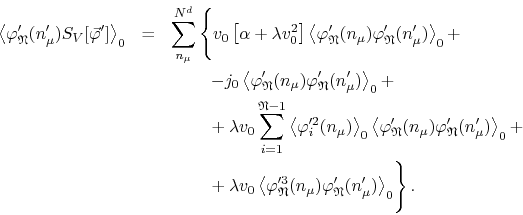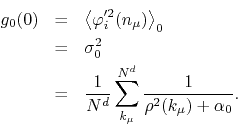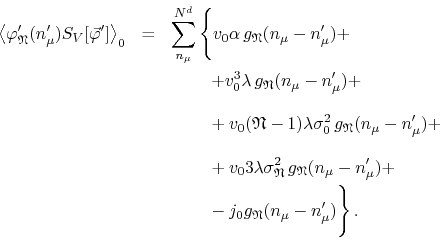Next: The Expectation Value of Up: Calculation of Expectation Values Previous: Calculation of Expectation Values
Let us now calculate the expectation value
Since
![]() is field-even, all expectation values of
field-odd observables are zero when calculated in its measure. Therefore
it is necessary that the observables be field-even if their expectation
values are to be non-zero. Since in this case we have an explicit factor
of
is field-even, all expectation values of
field-odd observables are zero when calculated in its measure. Therefore
it is necessary that the observables be field-even if their expectation
values are to be non-zero. Since in this case we have an explicit factor
of
![]() , it follows that only the field-odd part of
, it follows that only the field-odd part of
![]() will contribute to this expectation value,
will contribute to this expectation value,
If we write the expectation value out, using the form of the action
![]() given in Equation (A.1), we get
given in Equation (A.1), we get

The expectation values in the first three terms turn out to be just the
position-space propagator for the
![]() field
component. From Appendix B, Equation (B.2),
we get
field
component. From Appendix B, Equation (B.2),
we get

which is just the statement that
![]() is the
inverse Fourier transform of the momentum-space propagator. We also have
the corresponding result for the other field
is the
inverse Fourier transform of the momentum-space propagator. We also have
the corresponding result for the other field
![]() components, with
components, with
![]() ,
,

The second expectation value that we must calculate, with
![]() , is
simply
, is
simply

The third expectation value that we must calculate can be found in Appendix B, Equation (B.9), and can be shown to be given in terms of the first one by
We are thus left with a simpler form for the expectation value,

In all terms the only quantity still depending on ![]() is
is
![]() , so that we can write this equation as
, so that we can write this equation as

Using Equation (B.3), which gives this final sum, we may finally write